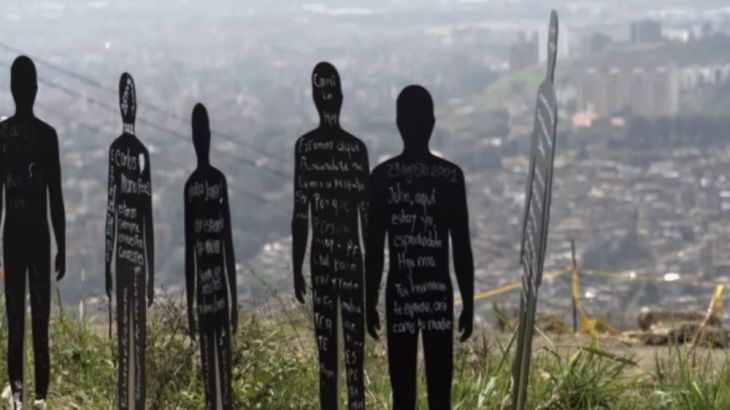
Ghosts of Medellin
A decade-long search for a disappeared girl leads to what could be one of the largest urban mass graves in the world.
Margarita Restrepo has been searching for her daughter who disappeared during the Colombian civil war more than a decade ago.
She believes her daughter’s body may be in a mass grave on the edge of the infamous Comuna 13 slum in Colombia’s second largest city, Medellin.
Keep reading
list of 4 itemsPalestinian Prisoner’s Day: How many are still in Israeli detention?
‘Mama we’re dying’: Only able to hear her kids in Gaza in their final days
Europe pledges to boost aid to Sudan on unwelcome war anniversary
Many of those who disappeared at this time are believed to be victims of the notorious military operation known as Orion. In this operation, government soldiers and paramilitary death squads worked together to “disappear” opponents.
As Margarita struggles to find her missing daughter, she meets the lead forensic investigator working on the grave site hoping to find closure for the families.
Also assisting with this process is a former death squad commander, “Mobile 8”. Now behind bars, Mobile 8 provides a rare account into the operations behind the disappearances, and potential insight into what may have happened to Margarita’s daughter.
FILMMAKER’S VIEW
By Simone Bruno, Javier Castaneda and Toby Muse
After years of covering Colombia, we know that it is a country of happiness and tragedy. The country that regularly tops the global happiness charts is also the site of a long-running civil war that has killed hundreds of thousands.
Among a variety of cruelties, perhaps the most heartbreaking is the issue of Colombia’s disappeared. Victims simply never return home and the families are left for ever ignorant of what happened. Without a body, without knowing if they are dead or alive, these families never get a sense of closure.
That was the story we set out to film when we started this documentary. When we began following Margarita Restrepo, we found a nuanced story of unbearable pain mixed with an inspiring dedication to trying to change her country.
Margarita is typical of many in Colombia who struggle to earn a living. In the midst of a war where having the wrong political opinion could get you killed, she had remained apolitical. And while she had forgotten about politics, politics hadn’t forgotten her. Her daughter Carol disappeared in the middle of a notorious military operation to root out Leftist rebels from Medellin’s infamous Neighbourhood 13, once known as the city’s most dangerous and poorest neighbourhood.
It is ironic, she says, that she voted for Alvaro Uribe, the president who would order the military operation in which her daughter disappeared. She feels an impotent rage that she somehow contributed to her own daughter’s disappearance.
During the making of this documentary, we came to see that being a victim in Colombia carries its own stigma – as if your family’s suffering is itself proof of guilt. Still after all this time, when everyone knows the violence is random and motiveless, there are still those who when they see a victim think to themselves, “they must have done something wrong”.
It was interesting for us to see the reaction of the people of Medellin to the dig to find the bodies. While many supported the dig and the mothers of the disappeared, others thought it a waste of time.
One taxi driver told us: “They ought to hire a priest. Send him up to bless the earth and then go home. That way you’ll save a lot of money.”
We also spent a lot of time thinking about Medellin. The mayor’s office is keen to present a city of the future, made up of shiny new buildings and a population looking forward. In this, they have had willing accomplices in the international media – journalists spend three days in the plushest hotels and restaurants and fly home to write about the city’s perceived “renaissance”.
The families of the disappeared, like Margarita, say the foundations of the new city cannot be the bodies, unclaimed and unnamed, of their loved ones.